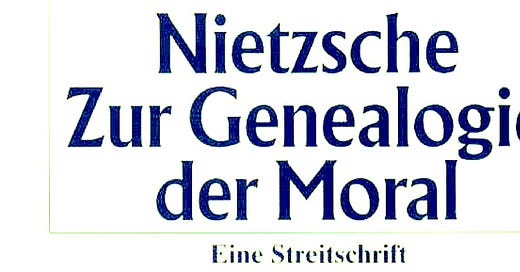Special 1-Day Seminar: Friedrich Nietzsche's Genealogy Of Morals
join me Saturday, May 31 for an intensive learning experience working through key ideas of this great book!
We’re offering a new 1-day online seminar at the end of May. This time around we will be working our way through an important and influential text of 19th Century philosophy, Friedrich Nietzsche’s book On The Genealogy Of Morals. Here’s the page for the seminar in the Study With Sadler academy, where you can see the curriculum and enroll if you’re interested. If you’d like to watch a short video in which I invite you to the seminar and explain what we’ll be doing, you can go here.
This is the third of these new seminars for this year, and it won’t be the last. Earlier, I offered similar seminars on the topics “Hegel’s Master-Slave Dialectic And Beyond” and “Three Key Stoic Ideas”. This is the first one where we’ll focus our entire time on one work, Nietzsche’s Genealogy. The next one I have planned for down the line will be on Plato’s great dialogue about love, the Symposium.
All of these seminars share a similar format:
We meet by Zoom for three 90-minute sessions, with 30-minute breaks in between them, on a Saturday (at 9 AM, 11 AM, and 1 PM Central Time).
Enrollment in the seminar gets you full access in advance to the class site, which includes links to the course text(s), some background information, and downloadable handouts on the key ideas that I’ve developed for my students.
We record each of the three seminar sessions, and I upload those within the class site as well, granting students lifetime access to those recordings.
During each of the three sessions, I will be leading students through one of the three essays comprising Nietzsche’s Genealogy, through a combination of lecture, discussion, Q&A, examples, and clarifications (If you’ve ever watched videos of my class sessions or talks, you’ll have a sense of how engaging I am with learners. We will, of course, be focused on the text, but we’ll also likely talk somewhat about applications to contemporary life and our experiences.
I have been studying this text since I first encountered it back in graduate school 30 years ago, and I’ve been teaching it regularly in classes for more than 25 years, so I’ve had plenty of time not only to get to know it well, but to develop a solid sense of where students are most likely to find it difficult or confusing, and why that the case.
This is one of my own favorite texts by Nietzsche for several reasons. One of them is that, while Nietzsche is a pretty anti-systematic thinker, this is probably the most systematic work he authored. Another is that it contains treatments of many of his key ideas, like differences in valuations and moralities, the will-to-power, the dynamic of ressentiment, the scope and prospects of science, and the danger of nihilism in late modern culture. You can add to that another factor, namely that reading Nietzsche is always an exciting experience!
Here’s what we’ll be covering during the seminar:
Session 1: Overview of the Text and Nietzsche's Thought, Preface to the work, Essay 1: Good and Evil", "Good and Bad". We will be discussing the following topics:
The Genealogy in context of Nietzsche’s works
Genealogy’s meaning in terms of philosophical method
The problem of the ethics of pity
Mistaken views of “English psychologists”
The original valuation of Good vs Bad
The priestly aristocracy and humanity as “interesting creature”
The slave revolt in morality and the valuation Evil vs Good
Metaphysics of will-to-power
The dynamic of ressentiment
Session 2: Essay 2: "Guilt", "Bad Conscience", and "Related Matters" We will be discussing the following topics:
The development of responsibility and conscience
The contractual relation of creditor and debtor
The multiple purposes and functions of punishment
The rise of the community and the state Ressentiment, justice, and revenge
Internalization of instincts
Religion arising in relation to ancestors
Christianity and the maximum God
The contemporary situation of nihilism
Session 3: Essay 3: "What Is The Meaning Of Ascetic Ideals?" We will be discussing the following topics:
What ascetic ideals are
Changes in Wagner’s works and motivations
Kant’s and Schopenhauer’s aesthetics
Philosophers’ fondness for ascetic ideals
The priest as an ascetic type
The ascetic ideal, life, and morbidity
Love of neighbor and will to power
Whether free spirits are really free
Science, scholarship, and ascetics
The situation of nihilism and whether there is a way forward
I hope that you’ll consider joining me and the students already enrolled in the seminar for this philosophical learning opportunity. I’m looking forward to it with great anticipation myself!
Gregory Sadler is the president of ReasonIO, a speaker, writer, and producer of popular YouTube videos on philosophy. He is co-host of the radio show Wisdom for Life, and producer of the Sadler’s Lectures podcast. You can request short personalized videos at his Cameo page. If you’d like to take online classes with him, check out the Study With Sadler Academy.




